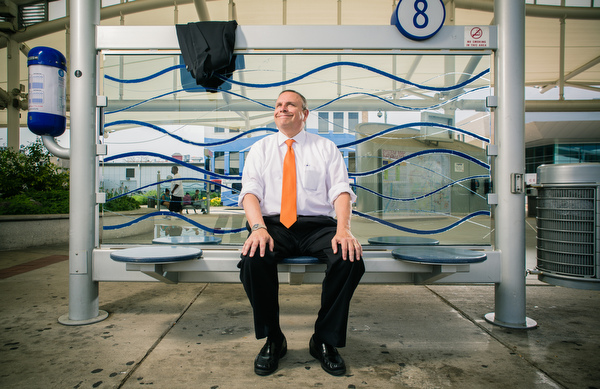Representative Rob VerHeulen Says Transit Will Move West Michigan Forward
As chair of the transportation subcommittee, State Representative VerHeulen says the time is right for serious investments in Michigan's transit systems.
State Representative Rob VerHeulen is a lifelong Michigan resident. He has worked as an attorney for Meijer, Inc. and the Meijer Foundation, served as mayor of the City of Walker, and currently represents the 74th district as a Republican in Lansing. And he says, as chair of the transportation subcommittee, that the time is right for serious investments in Michigan’s transit systems.
VerHeulen was elected to the state house in November 2012, and one of the first questions he asked when appointed as transportation chair was about the state gas tax. Since 1997 (the last time the tax was adjusted), Michigan has collected 19 cents per gallon of gas sold, with proceeds funding road improvements and infrastructure. What, he wondered, would the tax need to be today in order to generate the same amount of revenue as in 1997? The answer, according to VerHeulen, is that the tax would need to have risen to 32 or 33 cents per gallon just to keep revenue steady in 2013.
“So in real terms, we’re generating less revenue and we’re buying less gas because of hybrid cars and public transportation. But if you’re relying on traditional gas sales as your funding mechanism for roads, it’s not going to work,” says VerHeulen.
The transportation subcommittee is charged with deciding how to fund necessary improvements going forward in terms of airports, roads, bridges, and public transportation — no small task in an era of partisan divides and budget cuts. “We need to have a thorough conversation, and I’m hoping we’ll look at transportation funding long-term. It would be nice to find a solution to hold us for the next 15 or 20 years,” says VerHeulen. He cautions that short-term, stop-gap solutions are analogous to skipping an oil change or two in your car: you can get by for a little while, but as time goes on, you lose money because you end up having to replace the whole engine.
One innovation that holds promise is the Silver Line Bus Rapid Transit (BRT), which will be Michigan’s first rapid-transit bus system. It will serve a 10-mile stretch of Grand Rapids streets when completed in 2014. The project, which had been in the planning stages for 10 years before ground broke on the first station earlier this spring, is estimated to cost $15.6 million and will reduce bus commute times by 40 percent. Proponents hope it will raise property values along Division Avenue and spur economic investment in the area as well.
“I think the expectation is that the BRT will move things forward,” says VerHeulen. “A good transportation system is critical to attract businesses to West Michigan. It’s not the only factor, but it’s a necessary element. Also, public transit is important to people — particularly young people in urban areas. I think public transit will play a bigger role in West Michigan and throughout the state.”
Though he’s been a lifelong Michigan resident, VerHeulen takes a more global view on transportation and other issues, partly because of his experience at Meijer. “At Meijer, I touched virtually every aspect of the business — legal, real estate acquisition, transportation, regulation — so I had a unique view of state government. I saw some things that other states did differently,” he says. “I think it’s important to have perspective and to measure what we’re doing relative to other states as we compete for jobs.”
As a social and fiscal conservative who believes in local government control whenever possible, VerHeulen also sees a need for state government to nurture good public policy. “The role of state government is to create an environment that encourages investment in our state and a desire for people to come and stay in Michigan,” he says.
It’s a discussion that VerHeulen believes need to happen around many issues. “The economic trend is that there’s been less money for education, transportation, and general funds. We’ve been cutting spending and it’s difficult to find the money to make the necessary investments as we go forward,” he says.
VerHeulen graduated from Grand Rapids Creston High School and attended Grand Rapids Community College while working part-time before earning a bachelor’s degree from the University of Michigan and a law degree from Wayne State University. Unsurprisingly, then, he’s also passionate about the importance of quality public education in Michigan. “It’s critically important that we provide a quality education for all of our young people,” he says.
Going forward, VerHeulen thinks the time is right to address these challenges, with an emphasis on consensus, creativity, and sustainable, long-term solutions. VerHeulen notes, “Sometimes there are pure government solutions, but I really like when government can partner with the private sector and move the ball forward.”
It’s a perspective that comes from having worked in both public and private sector positions, and from having worked alongside one of West Michigan’s most respected business leaders for several years.
“Fred Meijer molded me the most,” says VerHeulen. “He was such a humble person with a huge heart. He wasn’t afraid to take risks for the organization, and he had a huge influence on my thinking.” Meijer passed away in November 2011.
VerHeulen says his public service to the 74th district is motivated by a love for West Michigan as well. “West Michigan is an incredible place,” VerHeulen says. “You’ve got folks who are passionate about their community, concerned about the next generation, good education, a wonderful work ethic, and a wonderful business community where the level of support for public projects is so high. It’s a great formula for making a great place to live.”
Stephanie Doublestein writes and blogs about food, business, and parenting, among other things. She lives in East Grand Rapids with her husband and their two young daughters.
Photography by Adam Bird











